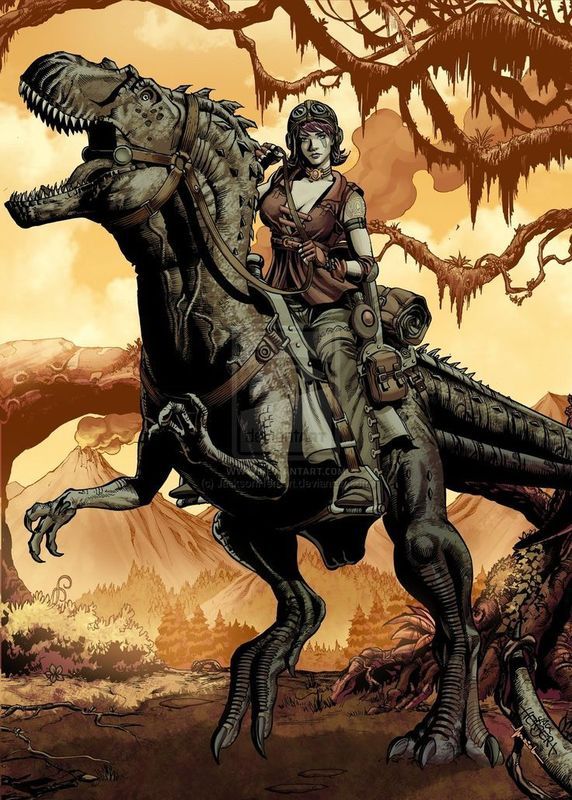[Planetary Romance] The Chv Rautha Achipelago

This post is for the players of my upcoming planetary romance game, first mentioned here. I originally planned to just write about Fate Accelerated chargen, but then I remembered this campaign tool from awhile back, and decided to incorporate it as well. The Same Page Tool is intended to get everyone on the same page so that the game isn't disrupted by clashing playstyles. There's more detail in the linked post, meanwhile here's the answers for this particular campaign:
- Do you play to win? b) Good play isn’t a win/lose kind of thing
- Player characters are: a) expected to work together; conflicts between them are mostly for show
- The GM’s role is: b) The GM preps a map with NPCs and/or monsters. The players have their characters travel anywhere they can reach on the map, according to their own goals.
- The players’ roles are… b) …to set goals for their characters, and pursue them proactively
- Doing the smartest thing for your character’s survival… a) …is what a good player does.
- The GM’s role to the rules is… a) …follow them, come what may.
- After many sessions of play, during one session, a player decides to have her character side with an enemy. This is… c) …something the player and the GM should set up ahead of time.
- A fistfight breaks out in a bar! The details of where everything is - tables, chairs, where everyone is standing is something that… c) …you can decide on the spot using specific game rules (spending Fate points)
- In order to really have fun with this game, the rulebook is something that… d) …everyone at least should know the basics of the rules.
- This game runs best when the players take time to create characters that are… c) …given strong motivations and an immediate problem or crisis
Fate Accelerated is not complicated, but it does require some creative thinking, rather than just choosing powers from a list.
To begin, choose a High Concept for your character. This is a short description of the "big picture" of what the character is. Such as "mad scientist" or "lovable rogue". Or, for instance, "adventure archaeologist" or "crossdressing airship captain".
Next, come up with two examples of how you can invoke your High Concept to give you an advantage during the game, and two examples of how the GM can compel your High Concept to cause problems for you. In FAE players have Fate Points which can be used to buy invokes. You start with 3, and get more by accepting compels offered by the GM.
For example, I played a character whose High Concept was "Insatiably Curious Scientist". My examples were:
- invoke to know data and theories about something
- invoke to research like a fiend
- compel to be tempted to mess with things you don't understand
- compel to discover--the hard way--that the real world doesn't always match up to ivory tower theory
Your High Concept and Trouble are both what FAE calls Aspects. You can also add up to three more Aspects to represent other important facets of your character. They might represent personality traits or physical abilities, a signature weapon or piece of equipment, relationships, or plot threads or narrative tropes. Some examples from the rulebook include "My Kung Fu Is The Strongest", "That? Oh, That's A Decoy", "My Inventions Almost Always Work. Almost", and "Crush on (other PC)". The aforementioned scientiest had "From The Core Worlds". There is a list of example Aspects here, with invoke and compel examples.
You don't have to choose them now; you can wait to add them later during play, if an idea comes to you later or if something happens in the game that inspires a new one.
The next step is to rank Approaches, which describe how your character prefers to do things. FAE has six Approaches:
- Careful
- Clever
- Flashy
- Forceful
- Quick
- Sneaky
Finally, choose one Stunt for your character. This is a particular thing your PC is especially good at. Stunts usually follow a specific formula:
"[Stunt Name]: Because I [describe some way that you are exceptional, have a cool bit of gear, or are otherwise awesome], I get a +2 when I [pick one: Carefully, Cleverly, Flashily, Forcefully, Quickly, Sneakily] [pick one: Attack, Defend, Create an Advantage, Overcome] when [describe a circumstance]."
Attack, Defend, Create an Advantage, and Overcome are the Actions you can take during play. The basic mechanic in FAE is Approach + Action. As with Aspects, if you're having trouble thinking of one you can wait to see if something comes to you during play. You will also be able to add additional stunts later.
Some examples:
- Silver Tongue: Because I am a smooth talker, I get a +2 when I Sneakily Create an Advantage when I’m in conversation with someone.
- Puzzle Solver: Because I am a lover of puzzles, I get a +2 when I Cleverly Overcome obstacles when I am presented with a puzzle, riddle, or similar conundrum.
- Shield Bash: Because I have a big kite shield, I get a +2 when I Forcefully Defend when I use my shield in close combat.
- Archaic Form: Because I've studied a mostly-forgotten lightsaber form, I get a +2 when I Cleverly Attack while fighting in a one-on-one duel.
- Stand Back! I'm Going to Try Science!: Because I am always fiddling with things, once per session I may declare that I have an especially useful device that lets me eliminate one situation aspect.
